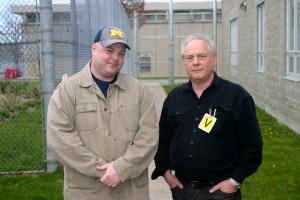Crime in the Family: A Look into John Kastner’s New Documentary
In 1998, 18-year-old Jennifer Jenkins’ parents found her shot to death in their home. Since that moment, the lives of Brian and Leslie Jenkins have been characterized by isolation and heartbreak; Jennifer’s death became intrinsically tied to the fact that the main suspect was their 20-year-old son, Mason.Director John Kastner delves into the broken home of the Jenkins family, exploring the grief and reconciliation behind the murder in his documentary film, Life With Murder.
Kastner has won four Emmys for his full-length documentaries–more than any other person in the history of Canadian television. The fourth came this November when he won the 2011 International Emmy Award for best documentary, Life With Murder.
“What [Kastner] manages to do so beautifully is he spends a lot of time in development,” said Silva Basmajian, the executive producer for the National Film Board of Canada (NFB). “He gets the trust of the individuals that he’s working with, which means that he has open access into their lives.”
“So knowing that he has that access,” Basmajian added, “[NFB] knew that he was going to get this incredibly authentic story and follow this family over a period of time.”
Many of Kastner’s films cover the lives of incarcerated criminals and their families. According to an interview with NFB, Kastner first developed an interest in covering such an intensely emotional topic at age 16, when he starred as the lead in a training film for prison guards. He spent three weeks hanging around convicts. He later became interested in the needs for offenders and, especially, the needs for families of offenders.
“When somebody murders your flesh and blood it’s this terrible dilemma,” Kastner said. “Do you break with that person or can you accept into the family somebody who murdered your father, your mother, your sister, your brother?”
This question is asked repeatedly throughout the film. The answer is neither simple nor easy, which makes it impossible for viewers not to sympathize with the two grief-stricken parents on screen.
“You can’t explain to people this nightmare of nightmares that you have been dealing with,” the filmmaker said. “It’s kind of like an alien landing from planet Venus trying to explain to an earthling what life on Venus is like.”
Kastner first heard about the Mason Jenkins story while filming Monster in the Family, a documentary about Martin Ferrier, a fellow inmate of Jenkins. Kastner began to develop a relationship with the Jenkins family and, eventually, they agreed to create the film.
“I knew I was interested in doing a film about murder in the family and how a family reconciles after such a murder,” he said. “I was eventually talking with a couple of offenders in that situation and I realized that the Jenkins’ were a natural story.”
The film pieces together shocking revelations about the case through Kastner’s own introspective interviews with the family and interrogation footage acquired from the police.
“Are you a journalist just out for the story,” Kastner added, “or do you really care? That’s how you get that material.”
The documentary has a rather non-traditional structure, forcing the audience to learn new information in the same sequence as Kastner himself did.
The police footage, released to Kastner halfway through filming, uncovered new information about the case. Slowly, Mason also begins to reveal the full truth for the first time on camera.
“For the first time [Brian and Leslie Jenkins] were actually finding out after 10 years what had happened,” Kastner said. “We ended up playing a surprising role, shall we say, in the story that was not one that we intended.”
The first screening of the film was at this year’s Hot Docs Film Festival. After the screening, Kastner introduced the Jenkins parents, both nervous about what the audience’s reaction to them would be. They received a standing ovation.
“It was so moving,” Kastner said. “Afterwards we had a party and you couldn’t get near them. They were like rock stars.”
Both Kastner and Basmajian believe that the film will help families in similar situations. Already, Kastner and Leslie Jenkins have given a seminar at an annual conference for parole officers about the problems that families dealing with a domestic murder face.
“That was another exciting aspect of this film,” Basmajian said. “We knew at the end of the day that it would have an enormous social impact.
“You really do care about those people,” said Kastner of his documentaries’ subjects. “It’s not just wanting–like a journalist–a story at any cost. I feel very strongly about the people I’m involved with and I remain friends with the Jenkins.”











